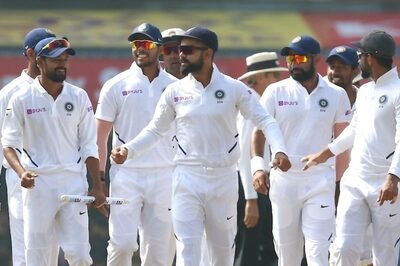
views
LONDON: British inflation picked up by a little more than expected in October as the COVID-19 pandemic continued to affect the cost of goods, with clothing and food prices rising during the month, official data showed on Wednesday.
Consumer prices rose 0.7% in annual terms, after a 0.5% rise in September, the Office for National Statistics said, still far below the Bank of England’s 2% target.
A Reuters poll of economists had pointed to a reading of 0.6%.
Unlike last year, food prices rose in October when people stocked up on potatoes and fruit.
Previously published shopping surveys had pointed to renewed stockpiling as health restrictions spread through Scotland, Wales and Northern Ireland in October. A one-month lockdown was announced for England at the end of the month and started on Nov. 5 in a bid to curb Europe’s deadliest COVID-19 outbreak.
Paul Dale, an economist at consultancy Capital Economics, said there had been “pockets of pandemic-induced inflation”.
“But we suspect that the weak economy will prevent a sustained period where inflation is above the 2% target, unless there is a no-deal Brexit,” he added.
In that case, Dales said inflation could rise to 3% or 4%, pushed higher by a fall in the value of sterling.
Other economists saw potential for more inflation as cuts to sales taxes and energy bills are likely to be reversed next year.
“If the surprise in the October data is sustained, that could push headline CPI inflation back close to 2% by next spring,” said JPMorgan economist Allan Monks.
But the likelihood of an incomplete economic recovery would probably leave underlying inflation weak, he said.
Earlier this month the Bank of England said it expected to hit its 2% inflation target in two years’ time.
Its main focus has been on supporting Britain’s economy through one of the worst years in its history.
The ONS said prices for clothes rose in October, returning to their normal seasonal pattern after disruption this year caused by the coronavirus lockdown.
The data showed how the pandemic has changed spending patterns in Britain.
Recreation and culture represented the biggest drag on inflation last month, as prices of package holidays and cinema outings fell. By contrast, prices of computer games rose.
A new energy price cap also tempered the rise in inflation in October.
(Writing by Andy Bruce; Editing by Catherine Evans)
Disclaimer: This post has been auto-published from an agency feed without any modifications to the text and has not been reviewed by an editor
Read all the Latest News, Breaking News and Coronavirus News here


















Comments
0 comment